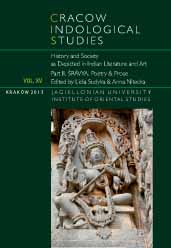Political Metaphors in the Mahākāvya: The Conceptual Metaphor the state is the human body in Māgha’s Śiśupālavadha
Political Metaphors in the Mahākāvya: The Conceptual Metaphor the state is the human body in Māgha’s Śiśupālavadha
Author(s): Anna TrynkowskaSubject(s): Cultural history
Published by: KSIĘGARNIA AKADEMICKA Sp. z o.o.
Keywords: metaphor; the state; the human body; Māgha; Śiśupālavadha.
Summary/Abstract: Politics is one of the subjects most frequently dealt with in Classical Sanskrit literature (kāvya), which, naturally, reflects, in its own specific manner, the most important aspects of the reality of life in its predominantly courtly milieu. In Sanskrit court epic poems (mahākāvya, sargabandha), stanzas concerning politics figure prominently especially in descriptions of rulers and their activities (rituals, military campaigns, etc.), as well as in speeches of characters taking part in the scenes of councils (mantra) and the dispatch or reception of envoys (dūta), which are all typical elements of the genre. The present paper employs the methods of cognitive linguistics, which have proven to be highly applicable in literary criticism, including the analysis of Vedic texts and Aśvaghoṣa’s Saundarananda, as well as in research into politics and social issues, to examine in detail the conceptual metaphor the state is the human body in the relevant passages of Māgha’s Śiśupālavadha.
Journal: Cracow Indological Studies
- Issue Year: 2013
- Issue No: 15
- Page Range: 23-36
- Page Count: 14
- Language: English

